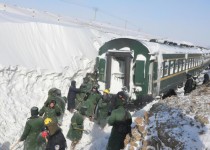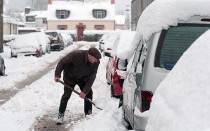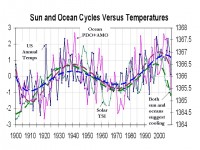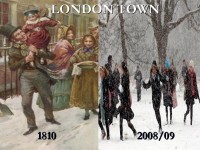How cold is it? Lizards falling from trees
By Randall Dickerson
The frigid weather hampered Northern firefighters and even made life hard for Florida’s tree- dwelling iguanas. Freezing iguanas were seen falling out of trees. Experts say the coldblooded reptiles become immobilized when the temperature falls into the 40s and they lose their grip on the tree.

See video here on how to handle a frozen Iguana.
China cold/snow has trains stopped in their tracks
By Xin Dingding and Wang Qian (China Daily)
Falling mercury causes power shortages; cold spell to continue. Three days in a row, Beijing set record daily lows. It was -2F yesterday. It was the coldest day since 1971.
The heaviest snowfall to hit northern China in nearly six decades continued to snarl traffic yesterday, stranding thousands of passengers on railways and at airports. The unusually harsh winter weather also caused coal shortages, forcing some provinces to cut power supplies. Though snow stopped in most parts in the north by yesterday morning, heavy snowfall and biting cold continued in parts of Inner Mongolia, Hebei and Shandong.
The heavy snow led to the delay of 13 passenger trains in Inner Mongolia, and forced the closure of all four airports in Shandong, as well as 30 state highways in northern China. Beijing Capital International Airport, with more than 1,400 flights scheduled to take off yesterday, reported severe disruptions. By 4 pm, 485 flights took off, 690 flights were delayed for an average of 90 minutes, and 98 flights were canceled, an airport spokesman said.
A train from Harbin to Baotou ran into snow more than 2 m high near Jining in Inner Mongolia on Sunday and passengers were evacuated only yesterday. All 15 carriages were buried in snow and more than 1,400 passengers were stranded in the train without lighting and heating. Food and drinking water were also in shortage, the local railway bureau said. “The snow was so high because this area is at a lower elevation. It piled up quickly, and huge gales continued to blow more snow in,” Zhang Jianwen, an armed police officer from Ulanqab League who led the rescue work, told China Daily.

“Though snow stopped yesterday, the temperature was -28 C, freezing the doors,” he said. Armed police managed to pry open one door, and with the help of the local railway bureau, evacuated the 1,400 passengers to a nearby railway station yesterday. Nearly 2,000 people, including armed police, railway workers and farmers, worked to remove snow from the rail track with shovels, he sad. “For a whole day, we only ate a steamed bun each after waking up at 4 am,” Zhang said.
As the train blocked the line, two more passenger trains were affected, too. “Some 2,000 passengers were stranded on the two trains, but we delivered food to them,” he said. By 6 pm, snow was finally cleared away from the railway, and trains could pass through at a slow speed, a spokesman for the Hohhot railway bureau surnamed Han said.
With people turning up the heat indoors to fight the extreme cold across the country, many provinces are reducing electricity supply due to the shortage of coal. Since December, power has been cut or reduced to more than 2,000 factories in Wuhan, Hubei province, to ensure supply for household use, while most parts of the south face electricity shortages, Han Xiaoping, an energy analyst, said yesterday.
With power demand surging this winter, coal stocks in 349 power plants across the nation have decreased to around 27 million tons, or barely enough for 12 days of generation, while stocks in the north have declined to less than a week, the Shanghai Securities News reported last month. Generally, coal stocks should be enough for at least 20 days, Han said.
But in Hubei province, things are much worse. The local electricity supplier faces a shortage of 760,000 tons of coal before March this year, Yang Yong, assistant chief engineer at Hubei Electric Power Company, told China Business News yesterday. Nearly 2.4 gigawatts, or some 17 percent of the coal-fueled power generation capacity in Hubei, has been shut down due to coal shortage and there is a risk of even more output cuts, the newspaper reported yesterday. Electricity suppliers in the north are also facing a great challenge with the temperature falling drastically through the earlier part of this week. In the next 10 days, temperatures could fall to around -32 C in the far north and another cold wave will sweep the region around Friday, bringing gales and severe cold, the national forecaster said. Experts predicted that the power shortage would last till the end of this winter. See story here.
See here where the China Met Service blames the extreme cold and snow on global warming. The heaviest snow yesterday hit northeastern Asia, which is suffering its worst winter weather for 60 years. More than 25 centimetres (10in) of snow covered Seoul, the South Korean capital - the heaviest fall since records began in 1937.
----------------------------
Britain faces gas shortage in freezing weather
Britain is braced for the prospect of running short of gas as the country is gripped by one of the coldest winters for a century. For the second time ever, the National Grid yesterday issued a warning to energy providers that demand for gas is threatening to outstrip supply.

The ultimatum comes after a 30 per cent rise on normal seasonal demand as snow and freezing conditions continued their stranglehold on Britain. The concerns caused natural gas prices to jump to their highest level in 10 months yesterday, touching 45p a therm. While it is unlikely that households will find their supplies restricted, a shortage could lead to higher bills. The National Grid, responsible for meeting the country’s energy requirements, issued a gas balancing alert (GBA) yesterday to give warning that any further falls in supply could force big users like power plants to cut their consumption.
The National Pensioners Convention (NPC) called on the Government and energy companies to help pensioners through the cold spell which has seen temperatures dip to 12 degrees F (-11 degrees C). Figures from the Office for National Statistics revealed 23,740 pensioners died from a cold-related illness between December 2007 and March 2008 last year; 281 a day or 12 an hour. That was seven per cent rise from the previous year and the NPC warned that with increased fuel and food prices and the coldest start to January for over a decade, the number of deaths in the next three months could rocket. See story here.
The return of the cold PDO and quiet sun has similarities to the 1960s, and early 1900s, notoriously cold periods for winters in the hemisphere.

The similarities to the solar cycles in the late 1700s and early 1800s has many talking a Dalton Minimum, the time of Dickens and snowy London town. Hmmmm (below and enlarged here).

-----------------------
Hard-up pensioners have resorted to buying books from charity shops and burning them to keep warm.
Volunteers have reported that ‘a large number’ of elderly customers are snapping up hardbacks as cheap fuel for their fires and stoves.
Temperatures this week are forecast to plummet as low as -13C in the Scottish Highlands, with the mercury falling to -6C in London, -5C in Birmingham and -7C in Manchester as one of the coldest winters in years continues to bite.
Workers at one charity shop in Swansea, in south Wales, described how the most vulnerable shoppers were seeking out thick books such as encyclopaedias for a few pence because they were cheaper than coal. One assistant said: ‘Book burning seems terribly wrong but we have to get rid of unsold stock for pennies and some of the pensioners say the books make ideal slow-burning fuel for fires and stoves. A lot of them buy up large hardback volumes so they can stick them in the fire to last all night.’ A 500g book can sell for as little as 5 pence, while a 20kg bag of coal costs 5 pounds sterling.
Read more here.




